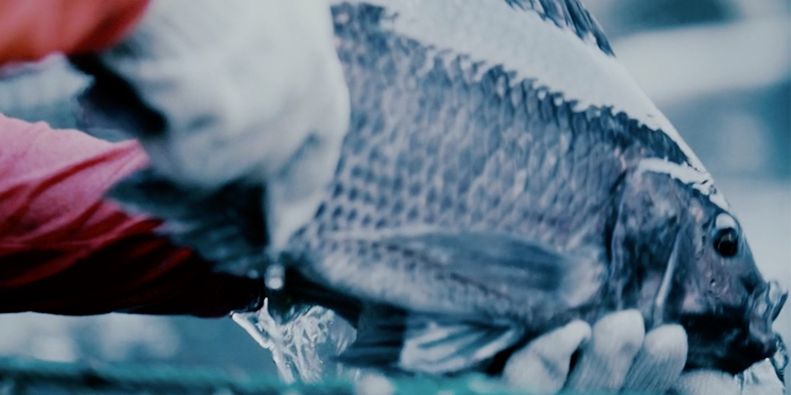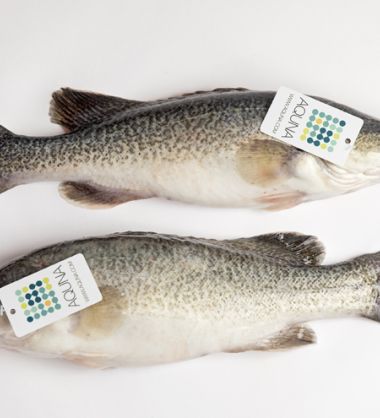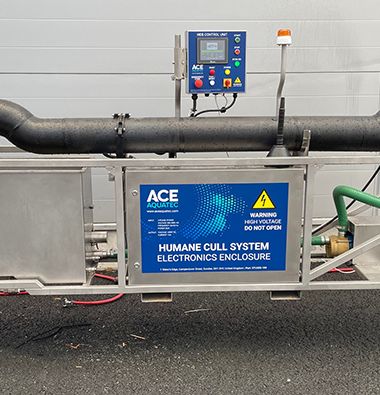Tilapia giant adopts humane stunning in global operations
18 January 2023

Ace Aquatec’s humane stunning technology, pioneered in salmon farming, has transformed the processing operations of the world’s biggest tilapia producer, after the system was adapted for the warm water species.
Regal Springs collaborated with Ace Aquatec to develop the in-water electric stunner, the Humane Stunner Universal (A-HSU), for tilapia and has now introduced the high welfare solution into its main processing facilities in Mexico and Honduras. The company is also planning to install an A-HSU system in its Indonesia processing facilities in Q1 2023.
And not only have the new stunners ensured that Regal Springs tilapia is harvested humanely and effectively, they have also streamlined production and delivered better quality fish.
In quality tests conducted by Regal Springs, the tilapia sustained no electrical damage and the company was very happy with the overall flesh standard.
Regal Springs sustainability manager Emily McGregor said: ‘Sustainability has been at the heart of our business for more than 30 years and, in the spirit of continuous improvement, we stand proud of pioneering new ways with fish welfare.
‘The humane stunner not only ensures better treatment of the fish, but helps deliver a superior quality product through reduced stress levels in the catchment process.
‘This is a huge step forward, from thermal stunning to a more humane and controlled stunning process, and, with this, towards better fish welfare. ‘
As a side effect, process and quality parameters have also improved, with reduced bruising, better quality of the fillets, and better working conditions for staff.
‘This supported Regal Springs’ decision to move from pilot trials to immediate uptake of the equipment, and proliferation across the business.’
The premium white fish producer, which raises tilapia in large floating nets in freshwater lakes in Mexico, Honduras and Indonesia, was looking for a stunning solution to both harvest its tilapia more humanely and address growing consumer and retail demand for responsibly sourced seafood.
Research has shown that nine in ten global consumers prioritise buying from companies that have ethical sourcing strategies in place, with 83% willing to spend more on a product if they can guarantee it meets a certain level of criteria (OpenText, 2021).
Petra Weigl, Regal Springs’ managing director for Europe, said: ‘Retailers can be confident in accessing the very best in tilapia fish protein, made viable through the way we raise and now harvest the fish - our ASC and BAP certifications being testament to the quality we offer.’
Ace Aquatec embarked on the tilapia project with Regal Springs more than two years ago, after a £1m award from the Humane Slaughter Association to provide pilot stunning equipment to farms that had no humane harvesting in place for finfish.
The company approached Regal Springs to conduct trials - in conjunction with Nautilus Collaboration, The Centre for Responsible Seafood, and Global Seafood Alliance - that would validate its technology with tilapia.
Beginning first in tank tests in Canada and then in commercial scale trials at Regal Springs in Mexico, the pilot proved to be a ‘gamechanger’ for Regal Springs and for tilapia farming.
Dr Jenny Bouwsema, Ace Aquatec’s academic advisor, who oversaw the field work for the project, explained how the ground-breaking system evolved.
‘In many ways, the technology is similar to that used for salmonids, fundamentally sending an electric field through water and stunning the fish,’ she said.
‘The big difference between salmon and tilapia, though, is that tilapia are very hardy, very hypoxia tolerant, meaning they can survive for a very long time on very little oxygen.
‘The challenge was not only finding a set of stunning parameters that would give them very quick insensibility, but working out how to get that to last until processing was complete.’
Traditionally, tilapia are culled by being cooled on ice, but it’s not clear how much consciousness they lose or whether they’re just paralysed, said Dr Bouwsema.
‘In the trial, the fish were coming through the stunner fully unconscious and were much easier to bleed. There was no flapping around and they were unconscious for long enough for people to be able to work with them.
‘To measure unconsciousness, we look at a number of behavioural reflexes, such as the eye roll reflex. We’re confident we’re getting very quick unconsciousness, and we’re now working on measuring brain activity in a parallel project with Stirling University.’
Ace Aquatec CEO Nathan Pyne-Cater said: ‘Regal Springs presented us with a unique challenge to create a bespoke product for them in the rural depths of Mexico.
‘Together, we created a stunning system that puts fish welfare at the forefront of their operations. UK consumers can have peace of mind knowing that the tilapia reared by Regal Springs has been raised to the highest standards.
‘This represents the beginning of a general acceleration across fish farming, and the wild sector, linking welfare at harvest with the economic value.
‘We are now working with barramundi farms in Australia, prawn farms in Europe, and the trout sector in Canada as consumers and regulators insist on more humane farming processes.
‘We’ve been able to demonstrate that when farms take a welfare first approach, they can see real economic gains in their business. This is critical if the mission to see all fish humanely harvested worldwide is to be achieved.’


